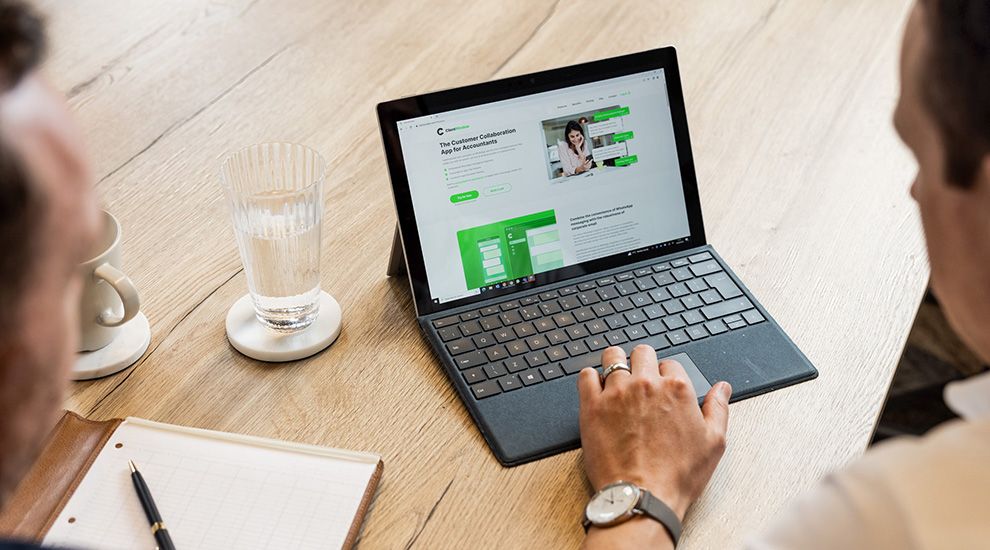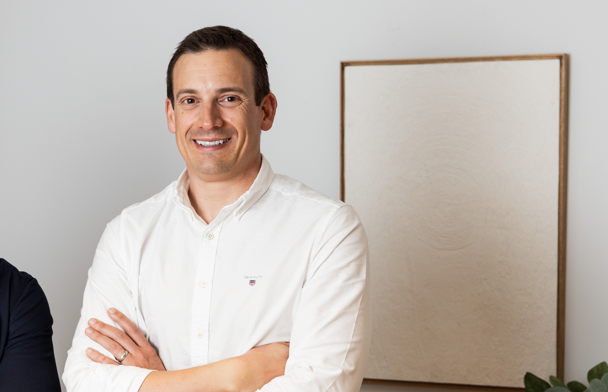

Most people will be familiar with the frustration that comes with thinking of something you need or want, whether for work or personal reasons, only to discover that such a product does not seem to exist.
In most cases, after moaning about the situation to anyone who will listen, you will return to the status quo, finding an alternative which “sort of does” but which continues to provide moments of annoyance.

Pictured: ClientWindow founder David Moehle. (Andy Le Gresley)
In the case of accountants David Moehle and Tim Zeale, though, they decided to go a step further and create their own product to solve a problem which they – and a number of other financial service providers – were experiencing with increasing regularity.
“We became aware of this problem about three years ago when clients of our practice, PKF bba, started sending business-related messages to our team members through WhatsApp,” David explained. “While this was a convenient method of communication for our clients, it created a raft of problems from a business perspective.
“Firstly, the only member of staff who could see those messages was the person to whom they were being sent. We couldn’t see what staff were saying to clients and if that team member was sick, on holiday or left the business, all of that correspondence went with them.
“Secondly, from a regulatory point of view, WhatsApp messages are regarded as off-channel communications, as the correspondence is taking place outside the business systems, which opens up all sorts of data protection and compliance issues. As clients’ preference for using WhatsApp grows, so regulators are becoming increasingly vocal about the issue. In fact, the US Securities and Exchange Commission has issued more than $2.5bn in fines to Wall Street firms in response to their failure to keep records of WhatsApp, iMessage and Signal messages. The FCA announced a similar crackdown in the UK earlier this year, and the first multi-million-pound UK fine was issued in 2023.”
Further risks to communicating with clients through WhatsApp and other messaging platforms, says David, come from the ability that clients have to delete their texts and the loss of messages if a staff member leaves or loses their device.
“There is a commercial risk that the company does something based on an instruction or information received through WhatsApp and that the client subsequently deletes that message, meaning that there is no record of the instruction having been given,” he explained. “If a client then takes legal action against the firm, there is no way of proving that the company acted in line with the client’s request.”
Having identified the risk to their business, Tim and David then encountered an even greater challenge – trying to find a solution.
“We went to the market to find a solution but we couldn’t find one, so we decided to build one,” David reflected.
And so ClientWindow was born, a communications platform founded by Tim, David and Dan Cattermole, who has a background in financial services and IT, as well as – crucially for the two accountants – a team of developers. ClientWindow seamlessly connects clients who prefer to use WhatsApp with business teams who use email. Working silently in the background, it solves, says David, any management and compliance challenges that come with WhatsApp.
“Effectively, ClientWindow is a platform which converts WhatsApp messages into emails and vice versa,” said David. “Not only does it convert the message into the desired format, but it also routes it to the right person or people within the business. It is a highly configurable system which ensures that instead of messages terminating on a staff member’s phone, they come into the company’s systems and are stored in ClientWindow, where businesses have full access control.”
Described in such terms, it sounds very simple but, as David explains, the technology facilitating that “simplicity” is very complex.
“Developing the product to do exactly what we wanted was very complicated, given the complexities involved and the cutting-edge features we wanted to deliver,” he said with a smile. “In addition to WhatsApp, the technology integrates WeChat, which is the equivalent of WhatsApp in the Far East, which is a key market for Jersey and UK-based financial services firms.”
Having first promoted the platform to fellow accountancy firms, the team expanded its availability earlier this year, launching it in the “wider financial services space”, where David says it has been adopted by clients in Jersey, the UK and further afield.
And it has also, he says, attracted the attention of companies and organisations in other sectors.
“We have been approached by law firms, estate agents, insurance firms, schools and even a local council who was looking at ways to help social workers communicate with vulnerable children over WhatsApp,” he explained. “ClientWindow is fantastic for accountants and financial services, but many types of organisations can benefit from using it.”
As well as rolling out the platform, which also works as an app, to such users, the team behind ClientWindow is now developing the software further to integrate it with additional messaging systems.
“By the end of this year, the app will be compatible with iMessage – which is particularly big in the US – as well as Facebook Messenger, X and Line, which is Japan’s equivalent of WhatsApp,” said David. “This is critical as there are so many international businesses with clients across the world.”
And while David admits that entering the world of software development has been akin to “learning another language”, he also feels a tremendous sense of pride that a system with such an “enormous use case” has been created in the Island.
“That this technology has been developed in Jersey is pretty cool for the Island,” he said. “While we have worked with developers across the world, this is very much a Jersey creation, and one which I hope gives the Island an edge as an international finance centre, as it shows the innovation here.
“We have also discovered, through this process, how generous people here are with their time and how keen they are to talk about something that you have created, which has been incredibly helpful in raising awareness and take-up in the product.
“That network effect has really supported our growth, to the extent that we now have several large software companies approaching us to talk about establishing formal partnerships and integrating our system into theirs, which is really exciting.
“After the nerve-wracking experience of our first demonstration, having had such a positive response gives us a real sense of achievement and we are really looking forward to rolling ClientWindow out further over the next few months.”